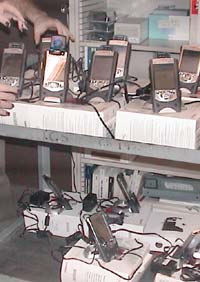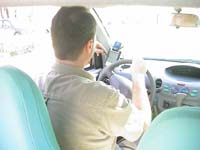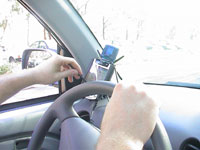Researchers at UCI Developing Mobile System Infrastructure
Calit² researchers at UCI developing
mobile system infrastructure
 Computers really are on the go at UC Irvine and tackling real-world problems in real time. One such problem is campus parking.
Computers really are on the go at UC Irvine and tackling real-world problems in real time. One such problem is campus parking.
A new mobile computing project spearheaded by UCI's Department of Information and Computer Science (ICS) and the California Institute for Telecommunications and Information Technology [Calit²] may help end the frustration of finding an empty parking spot. Armed with handheld personal computers, drivers can search for vacant spots at the touch of a button instead of stalking commuters to their parked cars.
"This truly is a generational shift in computing," said Rajesh Gupta, ICS associate professor and Calit² research leader. "The first shift in computing involved the development of personal desktop systems from the powerful mainframe systems. The coming shift moves desktop systems to mobile computing and networked systems. And these systems must offer users an infrastructure that is more than just mobile - it must be power and location aware."
Building an advanced infrastructure is what Gupta's research team has set out to do.
 In this initial phase, the team has handed out 53 preloaded Compaq iPAQ handheld computers, or PDAs (personal digital assistants), to ICS faculty and Calit² researchers. Eventually, a much larger number of PDAs will be distributed to include student participants.
In this initial phase, the team has handed out 53 preloaded Compaq iPAQ handheld computers, or PDAs (personal digital assistants), to ICS faculty and Calit² researchers. Eventually, a much larger number of PDAs will be distributed to include student participants.
The iPAQs not only contain standard mobile computing functions but also include global positioning software, wireless network connections and monitoring software enabling researchers to track individual use.
"What we have done is to create an infrastructure for research in mobile software," Gupta said.
By building the infrastructure, UCI researchers are laying the foundation for designing mobile computing software and systems that impact everyday living.
According to Gupta, traditional software is transformational - it takes data and transforms it into useful information. But mobile software must be reactive and in constant touch with an environment that directly impacts real life.
"This project, under Rajesh's direction, is a fundamental stepping stone in the progress of mobile computing," said Debra J. Richardson, the Ted and Janice Smith Family Foundation professor and ICS department chair. "A true visionary in embedded mobile computing, Rajesh has the foresight to imagine the possibilities and find useable solutions to overcome today's technological challenges."
Historically, Gupta explained, technology existed strictly to advance technology. "We use a computer to build a better computer and we use software tools to build even better software. Computing hasn't touched real-life applications too much - although in the past few years an evolution has begun."
 The evolution Gupta is referring to is the migration of computers into everyday living. Car navigation systems and 'smart home' technologies are relatively familiar examples. Designed to make life safer and a little easier, these computing tools utilize some of the basic concepts upon which future, highly mobile technologies will need to build.
The evolution Gupta is referring to is the migration of computers into everyday living. Car navigation systems and 'smart home' technologies are relatively familiar examples. Designed to make life safer and a little easier, these computing tools utilize some of the basic concepts upon which future, highly mobile technologies will need to build.
"Once we create a platform that is easy, that is powerful and mobile, then we have an entire host of imaginations - students, researchers and faculty - to think of interesting ways in which these devices can be used to enhance the quality of life," Gupta said.
Initially, the UCI mobile computing project will enable researchers to make improvements in power and location awareness capabilities. Eventually, these improvements will enable the generational shift for designing 'reactive' software and 'embedded' computing that directly impacts real life.
"We are laying the foundation for products and applications a decade into the future," said Bill Parker, vice chancellor for research and dean of graduate studies. As the interim division director for Calit², Parker leads a research effort involving more than 70 UCI faculty from half a dozen academic units.
"By teaming an interdisciplinary research agenda with 'living laboratories' such as the mobile computing project, we can integrate and test the more promising research ideas in a real-world setting," Parker said.
 By testing and advancing mobile software and system possibilities, researchers at UCI and Calit² will no doubt impact the lifestyles of countless people. Computer systems that can be embedded into any size environment - from a regional setting like a university campus to an extremely localized location like the human body - will monitor any number of events.
By testing and advancing mobile software and system possibilities, researchers at UCI and Calit² will no doubt impact the lifestyles of countless people. Computer systems that can be embedded into any size environment - from a regional setting like a university campus to an extremely localized location like the human body - will monitor any number of events.
While finding a vacant parking spot may be one of the more useful and immediate possibilities, mobile computing technologies that can save a life by tracking changes inside the body are well within the scope of future technologies.
"We have some glimpses of the possible applications," said Gupta. "But the surprises are still to come."
Related Links
